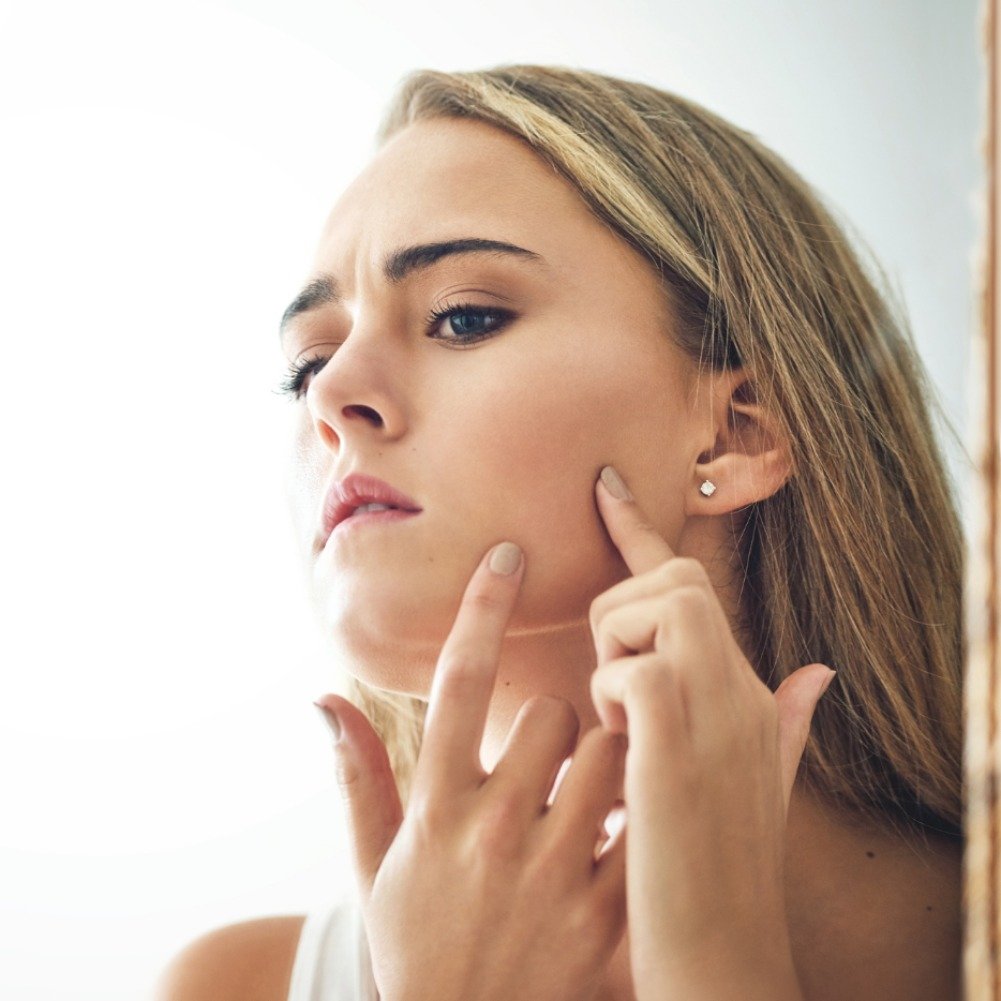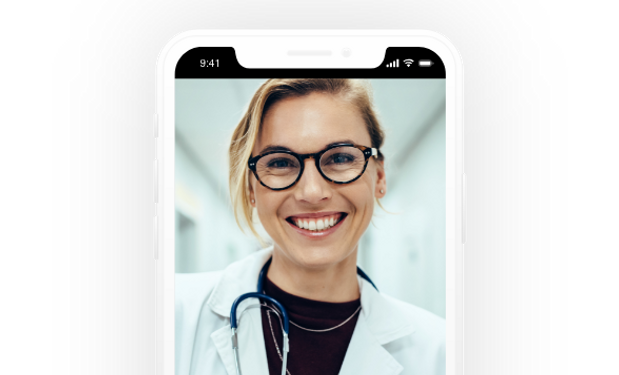WHAT WE TREAT
Acne
Acne is the most common skin condition in the United States, affecting an estimated 40 to 50 million Americans each year.
In fact, 85% of people between the ages of 12 to 24 deal with some form or severity of acne.
Although acne is not a life-threatening condition, it can become an irritating part of everyday life. Depending on its severity, acne can cause significant physical and/or psychological problems such as permanent scarring, low self-esteem, depression, and anxiety. Early treatment can help prevent long-term physical and emotional damage.

What is Acne?
Acne, also known as acne vulgaris or common acne, is a common skin problem that presents when hair follicles and pores become clogged with dead skin cells and oil. It can be found most commonly on the face, neck, back, and chest.
Acne can consist of blackheads, blemishes, whiteheads, pimples, or zits.
Acne tends to develop over a period of time, and can be categorized as inflammatory or non-inflammatory. Non-inflammatory acne is a milder form of acne, consisting of smaller pimples and blackheads. The more bacteria that accumulates within the oil-clogged pore, the higher the chance that inflammation will occur.
The severity of acne differs from person-to-person. There are three levels of severity of acne: mild acne, moderate acne, and severe acne.
-
Mild acne consists of comedones (blackheads and whiteheads), which plug up the pores in your skin with oil and dead skin. This is the least severe form of acne, and may include a few small pimples or comedones. Open comedones are known as blackheads, as the pigment in your skin reacts with the oxygen in the air. Closed comedones are referred to as whiteheads, and may also appear yellow.
-
Moderate acne describes the condition where patients have an increased number of inflamed pimples or small bumps (papules), or even pustules filled with yellow-colored pus.
-
Severe acne is seen when there are a significant number of papules and pustules in addition to the presence of red-colored, painful nodules or cysts on the skin. Nodule formation may lead to scarring.
Although acne typically begins around puberty, and is common throughout the teenage and young adult years, it can occur at any stage in life.
What Causes Acne?
Acne is caused when the pores on our skin become clogged. Dead skin cells accumulate in pores when the body produces lots of oil (sebum), causing the dead skin cells to stick together and become trapped.
Skin bacteria (propionibacterium acnes) can also enter the clogged pores of your skin. Once inside, the bacteria quickly multiply, causing the pore to become red and swollen. The inflammation may reach deep into skin, causing the formation of an acne cyst or nodule.
Hormonal changes during the teenage years, pregnancy, or before menstrual periods may contribute to the increased incidence of acne during these time periods. This is most often due to the increase in oil production, and causes pores to clog. Even newborns can develop acne, often from hormones passed from their mothers before birth.
Patients with certain endocrine conditions, including polycystic ovary syndrome and Cushing’s syndrome, can develop acne outbreaks.
Certain medications, such as corticosteroids and lithium, can cause the development of acne.
There may be a familial, or genetic, component of acne. If someone in your immediate family had severe acne, you are more likely to experience it as well.
Using oil-based skin products or cosmetics may worsen the condition of acne, as they can contribute to the oil accumulation within your pores.
Similarly, dirty skin may worsen the condition of acne, but acne – including blackheads and whiteheads – is not caused by dirty skin.
Some people believe that eating greasy foods, dairy products, carbohydrate-rich foods, chocolate, or sugary desserts with a high glycemic index can cause acne. While there may be a relationship between consumption of these foods and the worsening of your acne, these foods do not directly cause acne.
While stress may tend to worsen the condition of your acne, stress does not cause acne.
Signs and Symptoms of Acne
Patients with acne can have any of the following outbreaks on their skin:
-
Blackheads
-
Whiteheads
-
Pimples
-
Zits
-
Papules
-
Pustules
-
Cysts
-
Nodules
These noticeable skin blemishes can range from mild to severe and be red, inflamed, or painful. Acne is most often found on the face, but it is also commonly found on the back, chest, neck, shoulders, upper arms, and buttocks.
Patients may also notice the appearance of dark spots or areas on their skin. These dark spots usually appear after acne has healed, and can take months to years to disappear.
Patients who experience cysts and nodules with their acne may develop permanent scars when acne clears up. The severity of these scars can be lessened or prevented with treatment.
Acne can last for a few months, a few years, or even throughout your life.
In addition to physical symptoms, acne may cause psychological symptoms in patients. Such psychological problems may require co-treatment along with acne treatment, and include:
-
Low self-esteem
-
Depression
Prevention of Acne
Although there is no way to completely guarantee that acne will not arise, there are actions you can take to reduce the number and severity of acne breakouts.
Gently wash acne-affected areas once or twice a day – washing more often can dry out your skin. If you have oily hair, wash it daily.
Use non-comedogenic or non-acnegenic and oil-free skin products, makeup, cosmetics, toiletries, and sunscreen – this will help reduce the chance that these products will clog your pores. Additionally, take the time to remove makeup before going to bed.
Take care to keep hair styling products away from the face, as many of these products are oil-based.
Shower after sweating, or after performing strenuous activities such as exercise.
Avoid touching your face excessively.
Stay away from tanning beds and excess sun exposure.
Avoid popping, picking, or squeezing acne.
Avoid or minimize exposure to oils and harsh chemicals, including petroleum.
If you get acne on your back or chest, avoid wearing tight clothes, which can rub and irritate your acne.
Eating a healthy and balanced diet can help minimize the worsening of acne symptoms that may be caused by certain foods.
Treatment of Acne
There are many effective treatments available for acne, and the condition can be successfully treated with appropriate medical care. Treatments for acne include treating existing acne, preventing new breakouts, and reducing the chance of scar formation.
Treating acne can improve physical symptoms, in addition to improving self-esteem or lessening acne-related anxiety and depression.
Some medications may take 4 to 8 weeks to take effect, so it is important to adhere to a treatment plan agreed upon by you and your medical provider, even if you do not observe immediate results. Even after results become noticeable, continuing to pursue treatment can help prevent further breakouts.
Cases of mild acne can often be treated with over-the-counter medications. Products containing benzoyl peroxide (Brevoxyl or Triaz) or salicylic acid (Propa pH or Stridex) help to clear up skin. Gently cleansing with warm water and mild soap (Dove, or Cetaphil) can also help clear up mild acne.
Acne that may be caused by hormonal flare-ups prior to menstruation may also be controlled with low-dose birth control pills containing estrogen.
If these treatments for mild acne are not effective, you may need stronger prescription medications or a combination of several different therapies. Mild to moderate acne can be treated by:
-
Draining large pimples and cysts by a medical provider
-
Using prescription antibiotic gels, creams, or lotions applied to the affected area
-
Using prescription retinoids applied to the affected area
-
Applying azelaic acid to the affected area
-
Taking oral antibiotics
-
Taking oral retinoids (isotretinoin) – this is the only medication approved for severe cystic acne, but has serious side effects such as mood disorders, depression, and suicidal ideation
Antibiotics that have been successful in treating acne include doxycycline, minocycline, tetracycline, erythromycin, trimethoprim-sulfamethoxazole, trimethoprim, and azithromycin.
Certain therapies can be combined in the treatment of acne, such as combination of oral antibiotics and topical retinoids.
Severe acne may leave scars. Although some scars go away with time on their own, scars can be removed via laser resurfacing, dermabrasion, or other treatment by a dermatologist or plastic surgeon.
When Should I Call a Doctor?
While some acne may clear up without treatment, other cases of acne will become worse without medical intervention.
It is best to consult with a medical provider experienced in treating acne, to avoid the risk of complications such as permanent scars, dark spots, and other psychological problems.
Dermatologists are medical specialists who can diagnose and treat acne.
Consider speaking with a medical provider if:
-
Your acne makes you shy, embarrassed, or depressed
-
Acne treatment you have tried is not working – if after approximately 3 months of over-the-counter treatment and your acne has not cleared, a medical provider can prescribe stronger medications
-
You are experiencing any side effects from acne treatment you have tried
-
Your acne is leaving dark marks or scars on your skin
Emergency Warning Signs
If you experience an allergic reaction after using an acne treatment medication, seek emergency care as soon as possible. Signs that this may have occurred include:
-
Feeling dizzy, faint, weak, or exhausted
-
Difficulty breathing
-
Swelling of the eyes
-
Swelling of the face
-
Swelling of the lips
-
Swelling of the tongue
-
Throat tightness
If this is a medical emergency, please call 911. For mental health emergencies, call 988.
Have a visit today
Virtual care is a convenient and secure way to receive medical care for conditions like acne by phone (where permitted) or video, 24/7/365.
